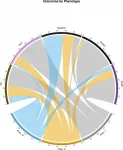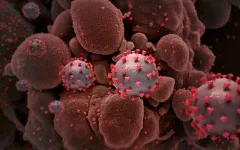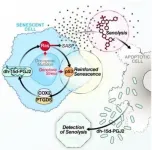(Press-News.org) New research led by investigators from Boston Medical Center and Grady Memorial Hospital demonstrates the significant decline in hospitalizations for neurological emergencies during the COVID-19 pandemic. The rate of Subarachnoid hemorrhage (SAH) - bleeding in the space between the brain and the tissue covering the brain - hospitalizations declined 22.5 percent during the study period, which is consistent with the other reported decreases in emergencies such as stroke or heart attacks.
Published in Stroke & Vascular Neurology, the study compares subarachnoid hemorrhage hospital admissions for the months following throughout the initial COVID surge, in hospitals that bore a greater burdened by COVID-19, and those that did not.
"SAH is a global health burden, with high fatality and permanent disability rates, representing a potential impact of these emergent situations," said lead co-author Thanh N Nguyen, MD, FRCPc, a vascular and interventional neurologist at Boston Medical Center, and a professor of neurology and radiology at Boston University School of Medicine. "These neurological conditions can be life-threatening if care is not being promptly sought."
Other important data from this study includes the rate of embolization of ruptured aneurysms and aneurysmal SAH hospitalizations, which declined by 11.5 percent and 24.6 respectively.
Hospitals with a higher COVID-19 hospitalization burden were found to be more vulnerable to the decline in SAH admissions and ruptured aneurysm coiling volume. However, even hospitals with lower COVID-19 hospitalization burden were found to have decreases in SAH admissions, suggesting that access to hospital care was not the main factor for these decreases.
The cross-sectional, retrospective, observational study was done including data from six continents, 37 countries, and 140 comprehensive stroke centers. Patients with the diagnosis of SAH, aneurysmal SAH, ruptured aneurysm in need of coiling interventions, and COVID-19 were identified through prospective aneurysm databases and ICD-10 codes. Monthly and weekly admission volume data were collected over three periods of time: March 1, 2020, to May 31, 2020 (pandemic months), November 1, 2019, to February 29, 2020 (immediately preceding pandemic months), and March 1, 2019, to May 31, 2019 (equivalent period one year prior to pandemic). The findings are similar to reported decreases in SAH city-wide in Paris during a two-week period of the pandemic, and decreases in a Toronto hospital, whereas other cities such as Berlin and Joinville (South Brazil) reported no decreases in SAH during the COVID-19 pandemic.
High and intermediate procedural volume centers were more affected by declines in SAH hospitalizations and ruptured aneurysm embolization than low volume SAH coiling centers during the pandemic. However, hospitals with low SAH coiling volumes demonstrated an increase in the coiling of ruptured aneurysms during the pandemic, despite a significant decrease in total SAH admissions.
"This suggests a shift towards treating more patients with ruptured aneurysms with endovascular techniques during the pandemic to potentially shorten hospitalization times and mitigate risks of perioperative infection to the patient or provider," says Raul Nogueira, MD, director of neuroendovascular service at the Marcus Stroke & Neuroscience Center - Grady Memorial Hospital, lead co-investigator and professor of neurology and radiology at Emory University School of Medicine.
INFORMATION:
About Boston Medical Center
Boston Medical Center (BMC) is a private, not-for-profit, 514-bed, academic medical center that is the primary teaching affiliate of Boston University School of Medicine. It is the largest and busiest provider of trauma and emergency services in New England. BMC offers specialized care for complex health problems and is a leading research institution, receiving more than $166 million in sponsored research funding in fiscal year 2019. It is the 13th largest funding recipient in the U.S. from the National Institutes of Health among independent hospitals. In 1997, BMC founded Boston Medical Center Health Plan, Inc., now one of the top ranked Medicaid MCOs in the country, as a non-profit managed care organization. Boston Medical Center and Boston University School of Medicine are partners in Boston HealthNet - 12 community health centers focused on providing exceptional health care to residents of Boston. For more information, please visit http://www.bmc.org.
About Grady Health System
Grady Health System is one of the largest safety net health systems in the nation and includes the 953-bed Grady Memorial Hospital, five neighborhood health centers, the Ponce de Leon HIV/AIDS Center, and Crestview Health & Rehabilitation Center. With nationally acclaimed emergency medical services, Grady has Atlanta's premier Level 1 trauma center - Metro Atlanta's only nationally verified Level 1 center - and serves as the 911 ambulance provider for the city of Atlanta. Grady's American Burn Association/American College of Surgeons verified Burn Center is one of only two in the state. And the Marcus Stroke and Neuroscience Center is a Joint Commission designated Advanced Comprehensive Stroke Center.
In a new study, researchers identify three clinical COVID-19 phenotypes, reflecting patient populations with different comorbidities, complications and clinical outcomes. The three phenotypes are described in a paper published this week in the open-access journal PLOS ONE 1st authors Elizabeth Lusczek and Nicholas Ingraham of University of Minnesota Medical School, US, and colleagues.
COVID-19 has infected more than 18 million people and led to more than 700,000 deaths around the world. Emergency department presentation varies widely, suggesting that distinct clinical phenotypes exist and, importantly, that these distinct phenotypic presentations may respond differently ...
HOUSTON - (April 2, 2021) - Understanding what drives food choices can help high-volume food service operations like universities reduce waste, according to a new study.
Researchers have concluded that food waste in places like university cafeterias is driven by how much people put on their plates, how familiar they are with what's on the menu and how much they like - or don't like - what they're served.
Food waste has been studied often in households, but not so often in institutional settings like university dining commons. What drives food choices in these "all-you-care-to-eat" facilities is different because diners don't perceive personal financial penalty if they leave food on their plates.
Published in the journal Foods, "Food Choice and Waste in University Dining Commons ...
A personalized tumor cell vaccine strategy targeting Myc oncogenes combined with checkpoint therapy creates an effective immune response that bypasses antigen selection and immune privilege, according to a pre-clinical study for neuroblastoma and melanoma. The neuroblastoma model showed a 75% cure with long-term survival, researchers at Children's National Hospital found.
Myc is a family of regulator genes and proto-oncogenes that help manage cell growth and differentiation in the body. When Myc mutates to an oncogene, it can promote cancer cell growth. The Myc oncogenes are ...
James McKerrow, MD, PhD, dean of the Skaggs School of Pharmacy and Pharmaceutical Sciences at University of California San Diego, has long studied neglected tropical diseases -- chronic and disabling parasitic infections that primarily affect poor and underserved communities in developing nations. They're called "neglected" because there is little financial incentive for pharmaceutical companies to develop therapies for them.
One of these neglected diseases is Chagas disease, the leading cause of heart failure in Latin America, which is spread by "kissing bugs" carrying the parasite Trypanosoma cruzi. These parasites produce an enzyme called cruzain that helps ...
A novel mechanism has been identified that might explain why a rare mutation is associated with familial Alzheimer's disease in a new study by investigators at the University of Chicago. The paper, published on April 2 in the Journal of Experimental Medicine, characterizes a mutation located in a genetic region that was not previously thought be pathogenic, upending assumptions about what kinds of mutations can be associated with Alzheimer's Disease.
Alzheimer's, a neurodegenerative disease that currently affects more than 6 million Americans, has ...
Buck Institute researchers have discovered and are developing a novel, non-invasive biomarker test that can be used to measure and track performance of senolytics: a class of drugs that selectively eliminate senescent cells. The discovery is expected to play a major role in efforts to develop treatments that would battle a myriad of chronic age-related conditions that range from arthritis to lung disease to Alzheimer's disease and glaucoma. This biomarker is a unique signaling lipid metabolite, normally exclusively intracellular, but is released when senescent cells are forced to die. This metabolite is detectible in blood and urine, making non-invasive ...
Gasoline, the primary transportation fuel, contains hydrocarbons with 5-11 carbons (C5-11) and is almost derived from petroleum at present.
Gasoline can also be produced from non-petroleum syngas. Nonetheless, achieving high conversions of syngas to C5-11 with excellent selectivity and stability remains a challenge.
A research group led by Prof. LIU Zhongmin and Prof. ZHU Wenliang from the Dalian Institute of Chemical Physics (DICP) of the Chinese Academy of Sciences realized highly efficient and selective conversion of syngas to gasoline-range liquid hydrocarbons over a dual-bed catalyst.
The study was published in Chem Catalysis on April 2.
This dual-bed catalyst, (CZA +Al2O3)/N-ZSM-5(97), consists ...
Up to one in five employees at an academic medical institution are considering leaving their professions due to the strains of coping with the pandemic in their own lives, according to a new University of Utah Health study. Individuals who had caregiving responsibilities were among those most likely to contemplate leaving or reducing hours.
The findings suggest that retaining highly trained doctors, nurses, and scientists in the aftermath of the COVID-19 pandemic could be the next great health care challenge.
"It's sobering to learn that, during a time of economic recession, at least one-fifth of our workforce were considering leaving their jobs because of the severe levels of stress they were experiencing," says Angela Fagerlin, Ph.D., the study's senior author and professor ...
SAN FRANCISCO, CA (April 2, 2021) -- In recent years, advancements in DNA sequencing have exposed a large amount of hidden diversity in reef-building corals: species that appear identical to one another but are genetically distinct. Typically ignored as they are invisible to the naked eye, a team of researchers at the California Academy of Sciences and The University of Queensland, along with over a dozen international collaborators, is taking a more holistic approach to understand these hidden species by investigating overlooked ecological differences that have wide-ranging implications for the vulnerability and resilience of reef-building corals. The team hopes that their findings, ...
What The Study Did: This survey study examined the career development, productivity, childcare needs and likelihood of leaving the workforce among employees at an academic medical center during the COVID-19 pandemic.
Authors: Angela Fagerlin, Ph.D., of the University of Utah in Salt Lake City, is the corresponding author.
To access the embargoed study: Visit our For The Media website at this link https://media.jamanetwork.com/
(doi:10.1001/jamanetworkopen.2021.3997)
Editor's Note: The article includes conflicts of interest and funding/support disclosures. Please see the article for additional information, including other authors, author contributions and affiliations, conflict of interest and financial disclosures, and funding ...




